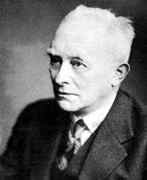
Max Born was a Polish-born mathematician who worked in Cambridge and received the Nobel Prize for Physics in 1954 for his work on Quantum Mechanics.
Born was no exception spending 1902 in Heidelberg, then 1903 at Zürich. * Born was soon in Göttingen attending lectures by Hilbert and Minkowski. * However he annoyed Klein by only making irregular attendances at his lectures, so Born decided to substitute astronomy for geometry as one of his doctoral subjects. * In addition to the mathematicians mentioned above, Born was in contact with Courant, Schmidt and Carathéodory around this period. * After the award of his doctorate, Born undertook compulsory military service, but because he suffered from asthma he served for much less than the standard period of one year. * Leaving Cambridge, Born returned to Breslau. * Around this time Born read Einstein's 1905 papers on relativity and was immediately captivated. * In 1912 Born was offered a post in Göttingen and, once on the teaching staff, he began a research project with von Kármán. * Born married Hedwig Ehrenberg, the daughter of a Professor of Law at Göttingen, in 1913. * In 1914 Born was offered a chair at Berlin where he became a colleague of Planck. * The war years were ones of exceptional difficulty for Born, eased by his friendship with Einstein. * They shared a love of music and they would play violin sonatas together, Einstein on the violin and Born on piano. * Two years later Born was back in Göttingen as Director of the Physical Institute. * Beginning in 1926, Born collaborated with Pauli and Heisenberg, who was a student of Born's, on quantum mechanics (the term "quantum mechanics" is due to Born). * Born produced work of fundamental importance in quantum mechanics beginning with this collaboration. * The rest of the morning was spent by Born in delivering his lectures to undergraduate honours students, attending to departmental business, and doing research work of his own. * After he retired in 1953 Born returned Germany making his home in Bad Pyrmont, near Göttingen. * Born wrote many textbooks and monographs, mostly for students or experts in the subjects but some are excellent popular accounts of science.
Born was no exception spending 1902 in Heidelberg, then 1903 at Zürich. * Born was soon in Göttingen attending lectures by Hilbert and Minkowski. * However he annoyed Klein by only making irregular attendances at his lectures, so Born decided to substitute astronomy for geometry as one of his doctoral subjects. * In addition to the mathematicians mentioned above, Born was in contact with Courant, Schmidt and Carathéodory around this period. * After the award of his doctorate, Born undertook compulsory military service, but because he suffered from asthma he served for much less than the standard period of one year. * Leaving Cambridge, Born returned to Breslau. * Around this time Born read Einstein's 1905 papers on relativity and was immediately captivated. * In 1912 Born was offered a post in Göttingen and, once on the teaching staff, he began a research project with von Kármán. * Born married Hedwig Ehrenberg, the daughter of a Professor of Law at Göttingen, in 1913. * In 1914 Born was offered a chair at Berlin where he became a colleague of Planck. * The war years were ones of exceptional difficulty for Born, eased by his friendship with Einstein. * They shared a love of music and they would play violin sonatas together, Einstein on the violin and Born on piano. * Two years later Born was back in Göttingen as Director of the Physical Institute. * Beginning in 1926, Born collaborated with Pauli and Heisenberg, who was a student of Born's, on quantum mechanics (the term "quantum mechanics" is due to Born). * Born produced work of fundamental importance in quantum mechanics beginning with this collaboration. * The rest of the morning was spent by Born in delivering his lectures to undergraduate honours students, attending to departmental business, and doing research work of his own. * After he retired in 1953 Born returned Germany making his home in Bad Pyrmont, near Göttingen. * Born wrote many textbooks and monographs, mostly for students or experts in the subjects but some are excellent popular accounts of science.
Born Rule. 2. Performed foundational research that helped lead to the development of modern statistical physics. 3. Published over 300 scientific papers, focused mainly on theoretical physics and mathematics. 4. Developed the probability interpretation of the wave function, which established the mathematical foundation for quantum mechanics. 5. Developed the Born-Jordan transformation, a continuous analogue of the discrete Fourier transform. 6. Was the first to solve the elastic scattering problem using quantum mechanics. 7. Made advances in the field of classical mechanics by studying the motion of charged particles. 8. Developed the famous Born approximation for calculating transition probabilities. 9. Made foundational contributions to number theory, the theory of functions, and the calculus of variations.
Born 11 December 1882, Breslau, Germany (now Wrocław, Poland). Died 5 January 1970, Göttingen, Germany.
View full biography at MacTutor
Astronomy, Origin Poland, Prize Nobel, Physics